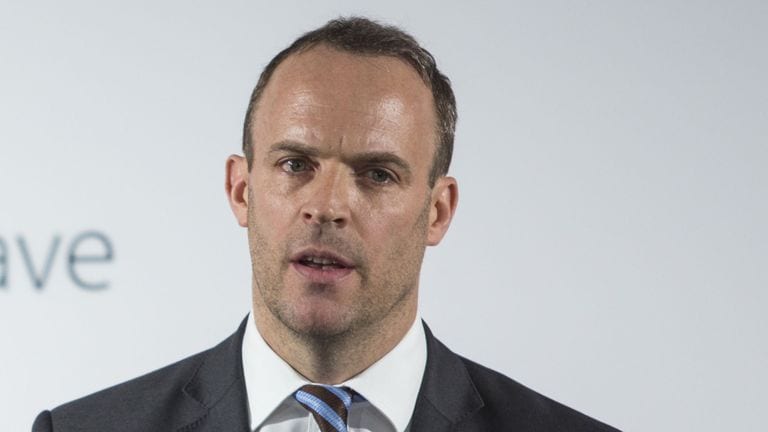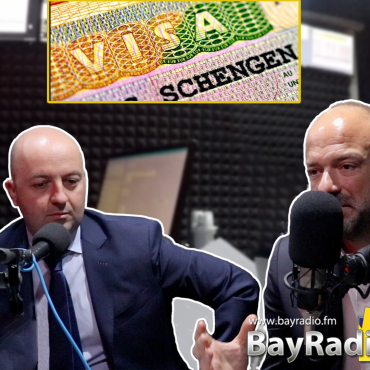
Customs checks will not be stepped up if the UK gets its way in trade deal talks with Brussels, the foreign secretary has suggested.
Dominic Raab told Sky News it would be the EU’s fault if businesses end up needing to fill out more paperwork or submit to more inspections of goods crossing at the border.
He was quizzed ahead of a major speech by Boris Johnson on Monday – his first since Brexit happened earlier this week.
The prime minister will be laying out his demands for a new trading relationship with all EU27 countries, which both sides have just 11 months to hammer out.
He is seeking a “Canada-style” free trade deal but is expected to insist he won’t trade sovereignty for alignment on goods regulations to decrease the need for inspections on what comes into the country.
Asked by Sophy Ridge on Sunday if the plans would only lead to more checks, Mr Raab said: “I don’t think so.
“We’ve got the deal, you can examine the terms.
“It’s not my words or anyone else’s words, and the commitment is to avoid all of those things with a best in class free trade agreement.
“And I’m sure – we’re committed to it on our side and I’m sure the EU will want to stay committed to the undertakings that they’ve made.”
He added if more checks were needed, “it would be I think a step backwards by the EU in terms of the undertakings they’ve made”.
Mr Rabb also criticised Michel Barnier, Brussels’ chief Brexit negotiator, who warned on Monday: “The UK has chosen to become a third country… It has chosen to create two regulatory spaces. This makes frictionless trade impossible. It makes checks indispensable.”
Asked if the comment was wrong, Mr Raab said: “Yes – if the EU lives up to its commitments on its side.”
But the government is still battling to win over Northern Ireland’s Democratic Unionist Party (DUP), which backed Brexit but refused to vote for the deal over concerns about the fall-back plan if no trade deal can be secured by the end of 2020.
DUP leader Arlene Foster told Sophy Ridge on Sunday said she was “concerned” and needed more “clarity” on the need for potential checks on goods travelling from mainland Britain.
“We worry about the fact that it might reduce our choice in terms of consumer choice in Northern Ireland, we’re worried about price and the fact that it may put up prices in Northern Ireland.
“And of course the very fundamental issue of having checks internally within a country is of great concern to me as a unionist.”
The EU is pessimistic about the short timetable for reaching a deal and made clear that Britain will have to accept worse terms and conditions for trade than if it were still a member of the EU.
European Commission President Ursula von der Leyen said: “We want to have the best possible relationship with the United Kingdom, but it will never be as good as membership.”
The UK left the EU on Friday 31 January and is now in a “transition period” where it remains in the single market and customs union, follows EU law and continues paying into its budget.
This will end on 31 December 2020.
Analysis: Raab’s pledge is hard to be squared with ‘Canada-style’ deal
By Rob Powell, political correspondent
It’s hard to see how the government’s aim for a relatively loose “Canada-style'” trade deal can be squared with Dominic Raab’s pledge of no border checks after Brexit.
For a start, the trade deal between the EU and Canada does not automatically remove checks on goods moving between the two parties.
But it’s Boris Johnson’s pledge that the UK will have “no alignment” with EU rules that may make border checks inevitable.
On everything from manufactured goods to food products, the EU will want to make sure imports from the UK meet the standards of their single market.
To try and get round this both sides agreed to “deep regulatory and customs cooperation” and “robust commitments to ensure a level playing field” when they signed off the Brexit divorce deal last year.
The aims outlined by Downing Street overnight strike a very different and more distant tone to this.
So while the government here may accuse the EU of backtracking on its offer of a Canada-style deal, Brussels will also feel the UK has reneged on its promises.









